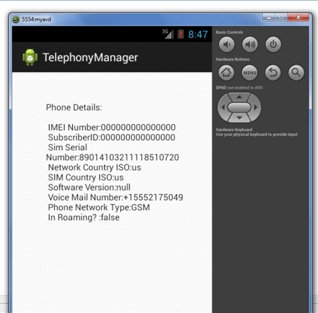The android.telephony.TelephonyManager class provides information about the telephony services such as subscriber id, sim serial number, phone network type etc. Moreover, you can determine the phone state etc.
Android TelephonyManager Example
Let's see the simple example of TelephonyManager that prints information of the telephony services.
activity_main.xml
Drag one textview from the pallete, now the xml file will look like this.
File: activity_main.xml
- <RelativeLayout xmlns:androclass="http://schemas.android.com/apk/res/android"
- xmlns:tools="http://schemas.android.com/tools"
- android:layout_width="match_parent"
- android:layout_height="match_parent"
- android:paddingBottom="@dimen/activity_vertical_margin"
- android:paddingLeft="@dimen/activity_horizontal_margin"
- android:paddingRight="@dimen/activity_horizontal_margin"
- android:paddingTop="@dimen/activity_vertical_margin"
- tools:context=".MainActivity" >
- <TextView
- android:id="@+id/textView1"
- android:layout_width="wrap_content"
- android:layout_height="wrap_content"
- android:layout_alignParentLeft="true"
- android:layout_alignParentTop="true"
- android:layout_marginLeft="38dp"
- android:layout_marginTop="30dp"
- android:text="Phone Details:" />
- </RelativeLayout>
Activity class
Now, write the code to display the information about the telephony services.
File: MainActivity.java
- package com.kundan.telephonymanager;
- import android.os.Bundle;
- import android.app.Activity;
- import android.content.Context;
- import android.telephony.TelephonyManager;
- import android.view.Menu;
- import android.widget.TextView;
- public class MainActivity extends Activity {
- TextView textView1;
- @Override
- protected void onCreate(Bundle savedInstanceState) {
- super.onCreate(savedInstanceState);
- setContentView(R.layout.activity_main);
- textView1=(TextView)findViewById(R.id.textView1);
- //Get the instance of TelephonyManager
- TelephonyManager tm=(TelephonyManager)getSystemService(Context.TELEPHONY_SERVICE);
- //Calling the methods of TelephonyManager the returns the information
- String IMEINumber=tm.getDeviceId();
- String subscriberID=tm.getDeviceId();
- String SIMSerialNumber=tm.getSimSerialNumber();
- String networkCountryISO=tm.getNetworkCountryIso();
- String SIMCountryISO=tm.getSimCountryIso();
- String softwareVersion=tm.getDeviceSoftwareVersion();
- String voiceMailNumber=tm.getVoiceMailNumber();
- //Get the phone type
- String strphoneType="";
- int phoneType=tm.getPhoneType();
- switch (phoneType)
- {
- case (TelephonyManager.PHONE_TYPE_CDMA):
- strphoneType="CDMA";
- break;
- case (TelephonyManager.PHONE_TYPE_GSM):
- strphoneType="GSM";
- break;
- case (TelephonyManager.PHONE_TYPE_NONE):
- strphoneType="NONE";
- break;
- }
- //getting information if phone is in roaming
- boolean isRoaming=tm.isNetworkRoaming();
- String info="Phone Details:\n";
- info+="\n IMEI Number:"+IMEINumber;
- info+="\n SubscriberID:"+subscriberID;
- info+="\n Sim Serial Number:"+SIMSerialNumber;
- info+="\n Network Country ISO:"+networkCountryISO;
- info+="\n SIM Country ISO:"+SIMCountryISO;
- info+="\n Software Version:"+softwareVersion;
- info+="\n Voice Mail Number:"+voiceMailNumber;
- info+="\n Phone Network Type:"+strphoneType;
- info+="\n In Roaming? :"+isRoaming;
- textView1.setText(info);//displaying the information in the textView
- }
- }
AndroidManifest.xml
You need to provide READ_PHONE_STATE permission in the AndroidManifest.xml file.
File: AndroidManifest.xml
- <?xml version="1.0" encoding="utf-8"?>
- <manifest xmlns:androclass="http://schemas.android.com/apk/res/android"
- package="com.kundan.telephonymanager"
- android:versionCode="1"
- android:versionName="1.0" >
- <uses-sdk
- android:minSdkVersion="8"
- android:targetSdkVersion="17" />
- <uses-permission android:name="android.permission.READ_PHONE_STATE"/>
- <application
- android:allowBackup="true"
- android:icon="@drawable/ic_launcher"
- android:label="@string/app_name"
- android:theme="@style/AppTheme" >
- <activity
- android:name="com.kundan.telephonymanager.MainActivity"
- android:label="@string/app_name" >
- <intent-filter>
- <action android:name="android.intent.action.MAIN" />
- <category android:name="android.intent.category.LAUNCHER" />
- </intent-filter>
- </activity>
- </application>
- </manifest>
Output:

No comments:
Post a Comment